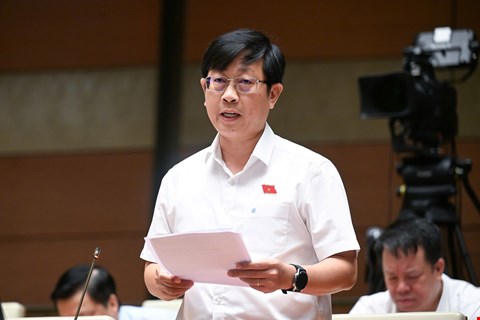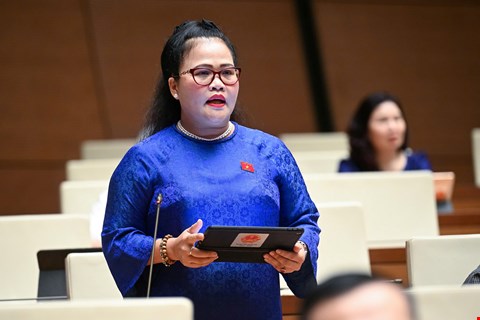On the morning of May 29, the National Assembly discussed in the hall the draft Law amending and supplementing a number of articles of the Law on Credit Institutions (CIs).
Participating in contributing opinions, delegate Nguyen Huu Thong - National Assembly Delegation of Binh Thuan province was interested in the regulation on the right to confiscate guaranteed assets (TSDB).
According to the delegate, the current regulation does not clarify the mechanism for protecting the rights of the party to ensure when there are complaints or disputes arising. It is not yet clear whether the confiscation can be temporarily postponed or canceled in cases where there are signs of violations or ownership disputes are being contested.
In addition, in Clause 5, Article 198A, the Draft Law stipulates that the right to seize the TSB states that the commune -level People's Committee (People's Committee) and the commune -level police agency where the seizure of security properties, within the scope of their functions, tasks and powers shall ensure security, order and social safety in the process of seizing security assets.
In case the guarantee does not cooperate or is not present according to the notice of credit institutions, foreign bank branches, organizing the purchase and sale, handling debt, representatives of the commune People's Committee where the seizure of security assets participates in witnesses and signs the record of seizing security properties.
The delegate said that the above regulation is not in accordance with the Law on Organization of Local Government. Accordingly, the Law on Organization of Local Government does not assign responsibility to the commune and commune levels and does not have the right to civil enforcement.
"This regulation may lead to legal risks in practice. I recommend that the confiscation of the secured property should only be allowed in cases where the secured party has a clear agreement in the contract, the property is not in dispute and is under legal possession.
At the same time, there should be regulations on the mechanism for monitoring and complaints of the party to ensure compliance", delegate Nguyen Huu Thong suggested.

Regarding the regulation on returning collateral as evidence in criminal cases, delegate Thong also said that the provisions in the draft Law on TCTDs are not consistent with other laws.
According to the delegate, the regulation that credit institutions can propose to return collateral such as exhibits and evidence is an important step in removing the situation where many collateral assets are suspended due to criminal cases, administrative violations, and causing delays in handling bad debts of credit institutions.
However, according to the Law on Handling of Administrative Violations and the Criminal Procedure Code, the regulation of handling exhibits and evidence is the right of the prosecution agency, not subject to the control of a third party.
In addition, the draft Law does not stipulate a specific time for returning assets. The delegate suggested that the drafting agency review, amend and supplement the draft Law to ensure consistency and correlation with other laws.

Delegate Nguyen Thi Suu - Hue City National Assembly Delegation suggested that the drafting agency of the Law should clarify the concept of organizing buying and selling and handling debts.
According to the delegate, the Law on Credit Institutions 2024 determines that an organization with 100% state capital has the function of buying and selling, handling debts and is abbreviated as an organization buying and selling, handling debts.
"So in addition to this subject, there are other subjects, because the draft Law stipulates that debt collection and settlement organizations are authorized to confiscate collateral for debt-selling credit institutions, and debt-selling credit institution assets management and exploitation companies.
Thus, it can be seen that in addition to the organization of buying and selling, there is another organization to perform this function," said delegate Suu.











